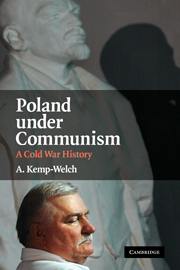3 - Thaw
Published online by Cambridge University Press: 06 January 2010
Summary
President Truman ‘was sure that the United States was God's own country, the city on the hill, the exemplar of a superior way of life based on personal freedoms, private property and entrepreneurial opportunity’. All this had been endangered by German and Japanese militarism, against which inter-war isolationism had proved ineffective. He thus agreed with Roosevelt that the USA must practise collective security and join international organisations, and trade associations, dedicated to this end. Within a few years, such general notions had hardened into a formal alliance structure, whose main object was confrontation with the Soviet Union.
When the Soviet Union began a Berlin blockade in June 1948, the USA responded with an airlift of supplies. But US military assessment of Soviet potentialities was cautious: the Soviets were bluffing and their hand could and should be called. Specialists on the Soviet Union considered the USSR too weak to risk war, despite overwhelming conventional superiority in Europe – which continued until the end of the Cold War. They had little at sea or in the air. Their satellites were unreliable and they had lost face in Italy, France and Finland (where communists had left government). Even so, the threat perception sharpened greatly following the Soviet detonation of an atomic bomb in August 1949. It now seemed to Washington that the Soviet leadership might go beyond bluff, particularly over Berlin. The possible addition of a hydrogen bomb, many hundred times more powerful than the weapons the USA possessed, was a further anxiety.
- Type
- Chapter
- Information
- Poland under CommunismA Cold War History, pp. 49 - 75Publisher: Cambridge University PressPrint publication year: 2008

